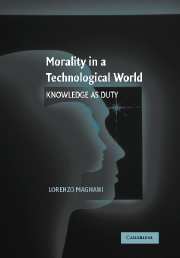Book contents
- Frontmatter
- Contents
- Preface
- 1 Respecting People as Things: Environment
- 2 Treating People as Means: Cloning
- 3 Hybrid People, Hybrid Selves: Artifacts, Consciousness, Free Will
- 4 Knowledge as Duty: Cyberprivacy
- 5 Freedom and Responsibility: Bad Faith
- 6 Creating Ethics: Good Reasons and Good Arguments
- 7 Inferring Reasons: Practical Reasoning, Abduction, Moral Mediators
- Afterword
- References
- Index
6 - Creating Ethics: Good Reasons and Good Arguments
Published online by Cambridge University Press: 18 July 2009
- Frontmatter
- Contents
- Preface
- 1 Respecting People as Things: Environment
- 2 Treating People as Means: Cloning
- 3 Hybrid People, Hybrid Selves: Artifacts, Consciousness, Free Will
- 4 Knowledge as Duty: Cyberprivacy
- 5 Freedom and Responsibility: Bad Faith
- 6 Creating Ethics: Good Reasons and Good Arguments
- 7 Inferring Reasons: Practical Reasoning, Abduction, Moral Mediators
- Afterword
- References
- Index
Summary
Morals excite passions, and produce or prevent actions. Reason of itself is utterly impotent in this particular. The rules of morality, therefore, are not conclusions of our reason.
David Hume, A Treatise on Human NatureWhile I deeply believe that creating and acquiring new knowledge is critically important, even I must admit that all the information in the world is meaningless unless we can use it effectively: the principles and ways of reasoning that allow us to put new ethical knowledge to work are just as important as the knowledge itself. The remainder of this book, then, will have a methodological focus: while the next chapter employs an epistemological and cognitive approach to explore the basic aspects of abductive scientific reasoning, the present one will consider its moral side. Hence, we can say that these last two chapters of the book are in some way twins, because they systematically treat similar issues in complementary ways. In using this approach, my hope is to reorient and modernize philosophical discussion in a way that eliminates the burden that traditional philosophy puts on moral agents by requiring an unrealistic level of competence, information, and (formal) reasoning ability.
Thus far, we have considered how new technology and changing economic circumstances have generated the need for new moral knowledge, and we have examined the social and cultural contexts in which moral reasoning takes place.
- Type
- Chapter
- Information
- Morality in a Technological WorldKnowledge as Duty, pp. 162 - 203Publisher: Cambridge University PressPrint publication year: 2007

